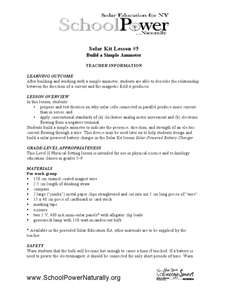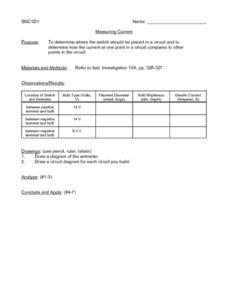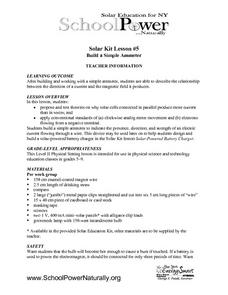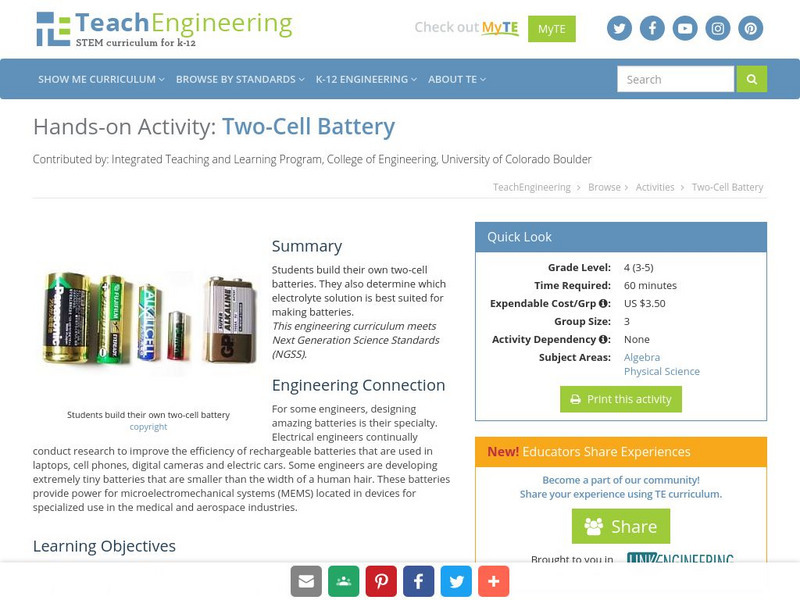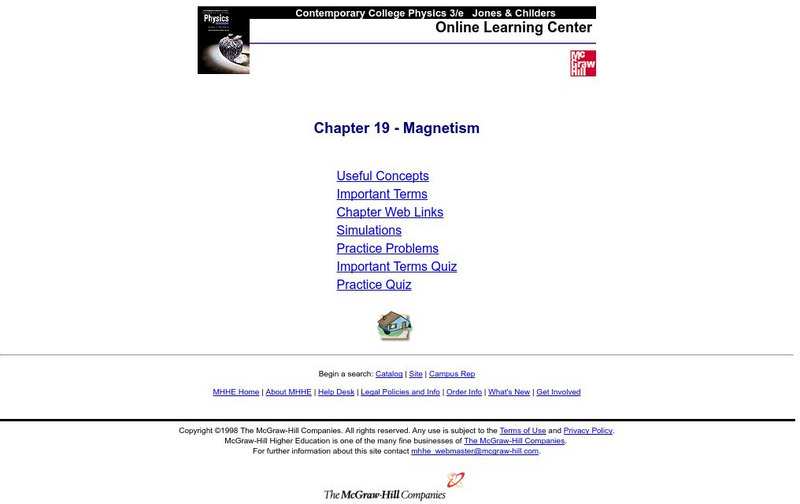Curated OER
Orienting a Photovoltaic Cell
By mounting a light bulb on a stand and a PV cell on another, physics apprentices experiment with the angle of incidence. Their goal is to determine the optimum angle for collecting solar energy. The use of a scientific calculator...
Curated OER
Solar Kit Lesson #5 - Build a Simple Ammeter
Emerging electricians build a simple ammeter for making measurements on an electric current. They test the placement of solar cells in both series and parallel circuits and examine the magnetic field produced by the movement of electrons...
Curated OER
Solar Kit Lesson #6: Solar-Powered Battery Charger
In a previous instructional activity, learners build an ammeter. That ammeter, or a pre-made one, is required in order to carry out this instructional activity. The objective is for lab groups to design a way to connect solar cells that...
Curated OER
Basic Ammeter Use
In this ammeter learning exercise, students answer eleven questions about ammeters, multimeters and types of circuits. They identify different types of circuits given schematic diagrams.
Curated OER
Measuring Current
In this measuring current instructional activity, students determine where the switch should be placed in a circuit and how the current at one point in a circuit compares to other points in the circuit. Students also draw diagrams of an...
Curated OER
Build a Simple Ammeter
Students build and work with a simple ammeter to test theories on why solar cells connected in parallel produce more current that in series. Students use the ammeter to indicate the presence, direction, and strength of an electric...
Georgia Department of Education
Ga Virtual Learning: Steady State Direct Current With Batteries & Resistors Only
In this interactive tutorial, students will analyze series circuits and parallel circuits along with complex circuits composed of elements in series and parallel. Learners will use schematics to help them understand these circuits....
University of Colorado
University of Colorado: Ph Et Interactive Simulations: Circuit Construction Kit
Build circuits with resistors, light bulbs, batteries, and switches. Take measurements with the realistic ammeter and voltmeter. View the circuit as a schematic diagram, or switch to a life-like view.
TeachEngineering
Teach Engineering: Two Cell Battery
In this hands-on activity, students build their own two-cell battery. They also determine which electrolyte solution is best suited for making a battery.
Science and Mathematics Initiative for Learning Enhancement (SMILE)
Smile: Electron Current Flow
A teacher lesson plan which could be easily converted into an idea for a student project or presentation. This page describes an activity in which the water-electricity analogy is used to investigate the relationship between current,...
National High Magnetic Field Laboratory
Magnet Academy: Rheostat
After discovering the nature of electrical resistance, scientists devised instruments like this one to measure and control it. (Java tutorial)
McGraw Hill
Mhhe: Chapter 19 Magnetism
A series of pages which define key terms and explain basic concepts related to magnetism. A set of practice problems with answers and solutions are given. Links to related internet resources and a list of animations are provided.
Concord Consortium
Concord Consortium: Measuring Current on a Breadboard
Find out how measuring current in a circuit is like measuring the flow rate of water in a sprinkler system.
CK-12 Foundation
Ck 12: Measuring Current and Voltage
[Free Registration/Login may be required to access all resource tools.] Students are introduced to the ammeter, which measures electrical current, and to the voltmeter, which measures voltage.



